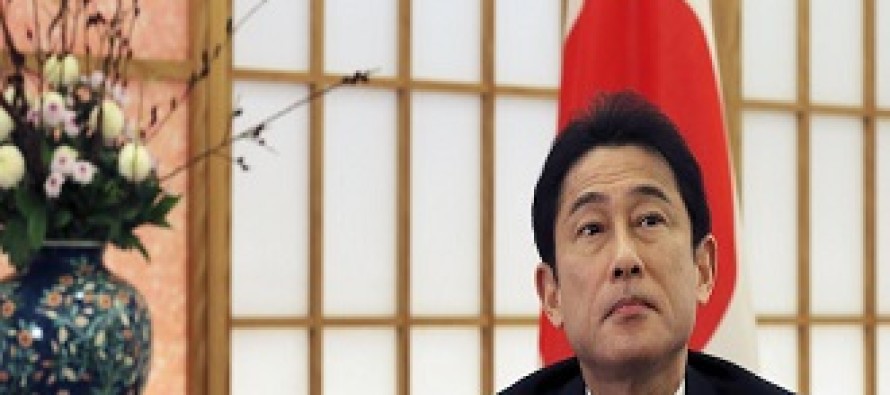Significance of the Japanese Foreign Minister’s visit to Bangladesh

Japan’s Foreign Minister Fumio Kishida visited Bangladesh from March 21 to 23 and held talks with Prime Minister Sheikh Hasina and several ministers including finance, foreign affairs, industry and commerce on how to promote further bilateral co-operation.
On 10th February 2012, Japan and Bangladesh observed the 40th anniversary of establishment of diplomatic relations. Japan has been a significant development partner to Bangladesh
Prime Minister Bangabandhu Sheikh Mujbur Rahman who visited Japan in October, 1973 had laid the solid foundation of bilateral relations. All heads of government of Bangladesh visited Japan to strengthen broad relationship. The successful handling by Bangladesh government of a hijacked Japanese airliner in Dhaka in October, 1977 deepened bilateral relations.
Prime Minister Sheikh Hasina visited Japan on November 28th November 2010 at the invitation of her Japanese counterpart and the visit had accelerated cooperation with Japan.
The visit is important in several ways. It signals Japan’s continued commitment to its bilateral interaction with Bangladesh and his handing over a congratulatory letter from Japanese Prime Minister to Prime Minister Sheikh Hasina on the occasion of the Independence of the country sends a strong message of Japan’s support for the current Hasina government.
From regional perspectives, Japan is eager to utilise Bangladesh cheap labour force and extend its massive network of factories in South and South East Asia, reflecting Bangladesh-Japanese cooperation in regional markets.
Japan has extended support to Bangladesh’s effort for economic and social development since its independence. Japan ‘s assistance is classified into three types: grant aid, technical cooperation and loan aid. Given the fact that Bangladesh is a Least Developed Country, Japanese aid is basically consists of grant aid and technical cooperation.
During his meeting with the Prime Minister, Prime Minister reportedly said that for further Japanese investment, a separate EPZ could be set up The Japanese foreign minister assured that his country would provide $1.18 billion to Bangladesh for development projects in gas, power, urban infrastructure, and capacity building of government officials.
Japan’s assistance in 2013 included Dhaka mass rapid transit (MRT), national power transmission development Project and Bheramara Power Plan Development project
and grant assistance for water safety for the people. JICA provided a loan up to US $63 million to the ‘Maternal, Neonatal and Child Health Improvement Project’ of the Health, Population and Nutrition Sector Development Program.
In 2014, Japan has decided to donate US$97,279 to GMark Foundation and US$121,623 to Society for Development Initiatives (SDI) to implement agricultural development projects in Bangladesh. Japan has been providing assistance to enhance human security at the grass-roots level since 1989 and a total of 180 projects have been funded through this scheme, amounting to US$ 13,890,148 in grant.
The Meghna Bridge ( Japan Bangladesh Friendship Bridge) was built at the cost of US$7.9 billion with the Japanese assistance and was opened in February 1991. This appears to be the single largest project with Japanese assistance anywhere in the world. Japan is keen to support power sector in Bangladesh after completion of formulating the ongoing comprehensive power development master plan for attaining stable power supply up to 2030.
The export from Bangladesh to Japan stood $622 million in 2012 while imports from Japan stood about at $1.3 billion.. Exports from Bangladesh to Japan expanded by 60% compared to the previous year as Japan relaxed rules of origin of Generalized System of Preferences (GSP) in April 2011. Bangladesh has duty-free access to Japan for woven products.
So far 208 Japanese companies have registered for investment of $1.24 billion. In private economic sector, the relations are increasingly strengthened and diversified. It is reported that Japan is keen to set up a heavy industry in Bangladesh by investing billions of dollars to manufacture instruments that would be used in the spaceships, including all types of devices required to launch satellites in the space.
Because of low birth rate and ageing population in the country, .it is reported that Japan will require about 90,000 foreign workers in future falling to a longer-term figure of about 700,000 a year over 30 years and Bangladeshi young skilled workers have an excellent opportunity to work in Japan.
Bangladesh’s relations are not confined only to economic relations. There are more than 10,000 Bangladesh nationals living in Japan and are engaged in various activities including business, employment, research and academic field. Bangladesh folk music accompanied with flute and string instruments has been very popular in Japan. The “Heian Zakura”- a Japanese traditional musical duo visited Dhaka last February and enthralled the audience.
One of the indications that Japan has penetrated in day-today-life in Bangladesh is the presence of Japanese manufactured cars and Japanese restaurants in Bangladesh.
An important characteristic of Bangladesh’s relationship with Japan is the way in which the diversification of bilateral economic relationship has grown over the years. There is every reason to believe that Japan’s importance to Bangladesh will continue to grow and one of the pillars of foreign policy of Bangladesh is to maintain and enhance–in both breadth and depth–the productive partnership with Japan.
Finally the visit has provided not only stronger bilateral architecture but also envisaged the process of expanding and integrating regional markets.


